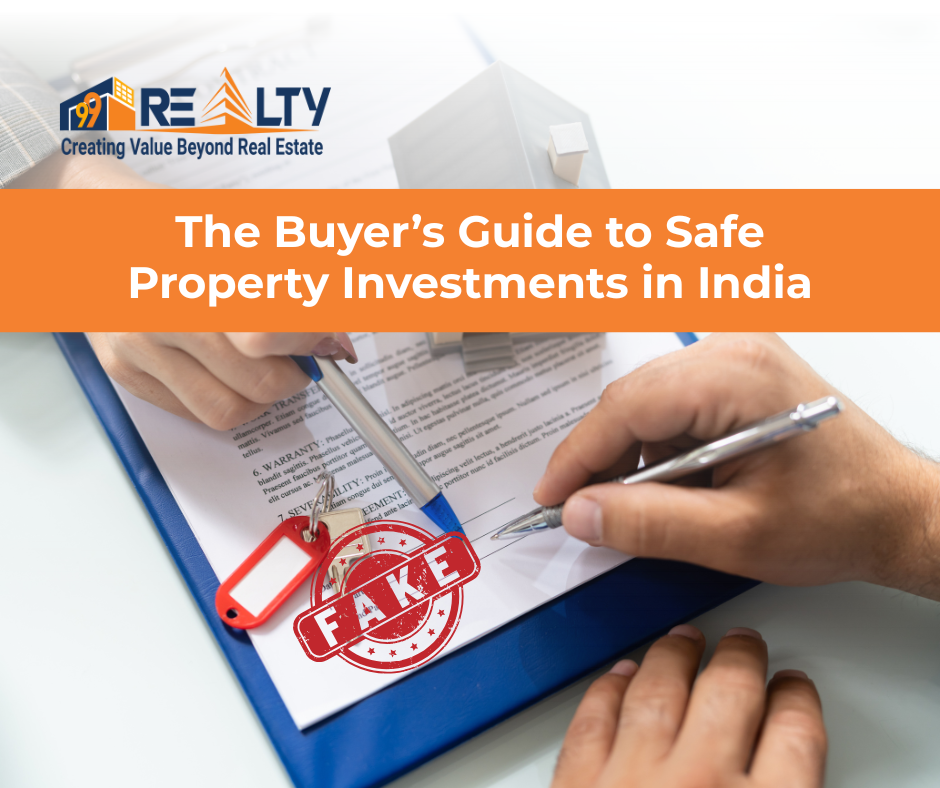Buying property in India is not just a financial decision—it’s an emotional one. For many families, owning a home is a lifelong dream. But that dream can quickly turn into a nightmare if you unknowingly buy land or a flat with fake property papers. With real estate fraud cases on the rise across India, it’s crucial to stay alert and learn how to separate real documents from forged ones.
This article will walk you through everything you need to know: the most important documents, red flags, verification methods, real-life examples, and practical steps to safeguard your hard-earned money.
Property Law Alert : SC Redefines Ownership Rules
Why Fake Property Papers Are a Growing Concern in India
The Rise of Property Fraud Cases
Property fraud isn’t new, but it has become more sophisticated. With rising property prices in metros like Delhi, Mumbai, and Bengaluru, fraudsters are finding new ways to cheat unsuspecting buyers. According to several state police reports, property-related frauds rank among the top white-collar crimes in India.
Common Tricks Used by Fraudsters
Scammers often:
- Forge signatures and seals.
- Create duplicate sale deeds.
- Sell the same property to multiple buyers.
- Use fake IDs to pose as owners.
Key Documents You Must Verify Before Buying Property
Sale Deed
This is the most important proof of property transfer. Ensure it’s registered at the Sub-Registrar’s office. Fake deeds often miss registration numbers or contain spelling errors.
Title Deed
Confirms ownership rights. A clear title deed should show the seller’s legal right to sell. Beware of “general power of attorney” sales—they are not valid ownership proof.
The Great Indian Homeownership Debate: Is Buying Still Worth It in 2025?
Encumbrance Certificate
This shows whether the property has any legal dues or mortgages. Always get this from the Sub-Registrar’s office for at least the last 15–30 years.
Mutation Certificate
Issued by municipal authorities, this ensures the property is transferred in your name for tax purposes. Missing mutation entries may indicate disputes.
Khata/Property Tax Receipts
Especially in Karnataka, “Khata” is essential for legality. Tax receipts also prove that the seller has been paying dues regularly.
Approved Building Plan and Occupancy Certificate
For apartments, check whether the builder has approval from local authorities. No occupancy certificate = illegal construction.
Possession Certificate in India: The Ultimate Guide to Secure Home Ownership
RERA Registration (For New Projects)
Every new project must be registered with RERA (Real Estate Regulatory Authority). Check your project’s details online on the RERA website of your state.
Red Flags That Indicate Fake Property Papers
Spelling Errors and Formatting Issues
Fraudulent papers often contain typos, mismatched fonts, or poor formatting. Authentic government documents follow standard formats.
Missing Watermarks, Seals, or Stamps
Genuine papers carry embossed seals, watermarks, or holograms. If missing, it’s likely fake.
Suspiciously Low Prices
If a property in a prime location is being offered at a throw away price, think twice. Scammers lure buyers with unbelievable deals.
Inconsistent Seller Identity
If the seller hesitates to share Aadhaar, PAN, or other ID proof, that’s a major red flag.
How to Verify Property Papers Step by Step
Visit the Local Sub-Registrar’s Office
This is where all sale deeds and encumbrance certificates are officially registered. Always confirm details here.
Cross-Check with Land Records Department
Each state has its own land records department. Ask for a Record of Rights (RoR) or 7/12 extract (in Maharashtra) to check ownership.
Use State Government Online Portals
Most states, like Karnataka (Bhoomi portal) and Delhi (DLRC), offer online verification of land records. These portals reduce the risk of forgery.
Consult a Legal Expert
Even if everything looks genuine, always get a property lawyer to verify the papers. It’s a small fee compared to losing your life savings.
Real-Life Property Fraud Cases in India
Urban Housing Scams
In Mumbai, several families lost money after investing in flats sold with fake occupancy certificates. The builder forged documents and vanished.
Village Land Grab Cases
In Haryana and Uttar Pradesh, fraudsters created fake land records and sold government-owned agricultural land as private plots.
How Technology Can Help Prevent Property Fraud
Blockchain-Based Property Records
Blockchain can provide tamper-proof property records. States like Andhra Pradesh are already experimenting with blockchain-based land registries.
Government Digitization Initiatives
The Digital India Land Records Modernization Program (DILRMP) aims to digitize all land records. Buyers should make use of these resources.
Role of RERA in Protecting Buyers
Mandatory Project Registration
RERA requires all builders to register their projects before advertising or selling. This ensures greater transparency.
Benefits of the RERA Act for Homebuyers
Accountability of Builders
Under RERA, builders can face penalties, fines, or even jail for providing false information.
Practical Tips for Property Buyers
Never Rely Only on Brokers
Brokers may hide information to close deals. Always verify independently.
Always Meet the Seller Personally
Meeting face-to-face builds trust and ensures the seller is a real person.
Hire a Property Lawyer
Even if it costs extra, legal help can save you from years of litigation.
What to Do If You Suspect Fake Papers
File a Police Complaint
Approach the local police’s Economic Offences Wing (EOW). Fraud cases are taken seriously.
Approach Consumer Courts or RERA
If you bought through a builder, you can file a complaint with RERA or consumer courts.
Seek Legal Recourse for Compensation
A property lawyer can guide you on civil suits for recovering money.
Conclusion
Buying property in India is not for the faint-hearted. With rising fraud cases, buyers must act like detectives before signing on the dotted line. Verifying documents, checking government portals, hiring a lawyer, and trusting your instincts can save you from huge financial loss.
Remember: if the deal looks too good to be true, it probably is. Protect your dream home by protecting your paperwork first.
FAQs
Q1. Can property papers be verified online in India?
Yes. Most states like Karnataka, Delhi, Maharashtra, and Telangana provide online land record verification portals.
Q2. How do I know if a sale deed is fake?
Check for registration details, seals, and verify at the Sub-Registrar’s office. Spelling mistakes and missing seals are red flags.
Q3. Is power of attorney (PoA) enough to buy property?
No. PoA is not proof of ownership. Only a registered sale deed transfers ownership.
Q4. What should I do if I already bought a property with fake papers?
File a police complaint immediately and consult a property lawyer. You may also approach consumer courts or RERA for justice.
Q5. Which is the safest way to buy property in India?
Buy RERA-registered projects, verify documents through official channels, and always consult a legal expert before making payment.
Disclaimer: Always verify property papers with legal experts before making any purchase decisions.
Need Help?
Need help evaluating a property or planning your next move in the market?
Reach out to 99 REALTY – your trusted real estate partner for smarter choices.
Subscribe to get updates on our latest posts and market trends.






Join The Discussion